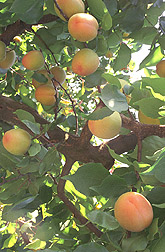This page has been archived and is being provided for reference purposes only. The page is no longer being updated, and therefore, links on the page may be invalid.
|
|
Apricots--Exotic and Familiar--Protected in National CollectionBy Marcia WoodJuly 17, 2003 Nearly 150 different kinds of apricot trees from around the world are growing in a special orchard in northern California. These apricots, along with a backup collection of trees living in 5-gallon pots inside a screened enclosure, make up America's official national collection of this delectable fruit. Known as the National Clonal Germplasm Repository for Fruit and Nut Crops, the genebank is headquartered at Davis, Calif., about 75 miles northeast of San Francisco. The repository is part of a nationwide network of genebanks managed by the Agricultural Research Service. The California collection safeguards not only familiar apricots but also their wild relatives. The collection's purpose is to ensure that the apricots' genes--in other words, the apricot breeding pool--aren't lost when orchards are pulled up and paved over, or when older, heirloom or antique varieties are replaced by new ones. Treasures at the Davis genebank include apricots from Russia, Poland, Kazakhstan, Turkey, Nepal, Pakistan, South Africa and about a dozen other countries. Some of these specimens have names as exotic as their origins, like Janjir, Khubani, Chaksa, Min-Dze-Sin and Luizet. Most of the apricots in the genebank orchard are varieties of Prunus armeniaca, the most widely planted apricot in the United States. Growers, treefruit breeders and hobbyist fruit gardeners use the collection. They also donate new specimens to it. That has helped make the genebank the largest publicly available assemblage of apricots in the United States. Among the genebank's most prized specimens are the remarkably sweet apricots collected during a 1988 expedition to Pakistan. ARS researchers based at Parlier, Calif., have bred the Pakistani apricots with varieties suited to the climate in California, where most of the U.S. commercial apricots are grown. Within a few years, the researchers expect to offer growers and nurseries a superb new apricot that boasts the luscious taste and pleasing texture of the Pakistani fruit, yet thrives in California. ARS is the U.S. Department of Agriculture's chief scientific research agency. |

